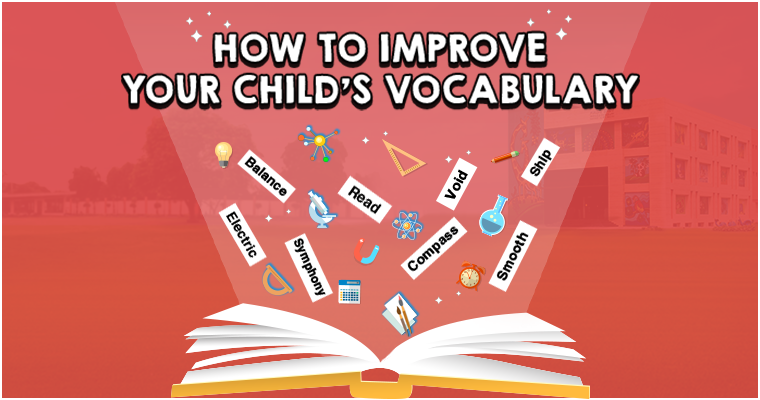How to Improve Your Child’s Vocabulary
“Books are the means by which we build bridges between cultures.” – Dr. Sarvepalli Radhakrishnan, Second Indian President, Philosopher, Teacher
And out of the pages of a book comes the ability to further one’s vocabulary, among the plethora of knowledge.
Simply put, a vocabulary is a set of words that are familiar to a person, usually within their own language. It develops with age and is a useful and fundamental part of communication. It goes far beyond the scope of merely speaking a language fluently by creating a path to being more articulate and knowledgeable.
But cultivating a good vocabulary is a continuous process that should be inculcated from childhood. For a child, a good vocabulary fosters a better understanding of the world and enhances communication skills by allowing them to properly convey their emotions or concepts. Here are a few ways to help children enhance their vocabulary:
- Prioritizing conversation – Younger children have a very strong grasping power, so it is necessary to submerge them in language from the beginning. Vocabulary is strongly influenced by the ratio of parent-to-child communication. If one wants to help their child build a good vocabulary, it is important to expose them to new worlds through varied conversation. Relating words and terms with things a child understands will help retention of those words and create a repository for future use.
It’s also important to encourage them to ask for the meaning of words they hear and simple explanations should be volunteered for newer, more complex terms adults use while communicating.
- Reading together – Reading is a surefire way to increase a child’s vocabulary. As a famous author, J.K. Rowling once said – “The most important thing is to read as much as you can like I did. It will give you an understanding of what makes good writing and it will enlarge your vocabulary.”
A parent must nurture a child’s interests and help find books based around them, aside from encouraging required reading for school. If a child is too young to read on their own, dedicate time, every day, to reading to them. Avoid being too repetitive with books; try to expand the scope to varied storylines from different authors, without pressure.
- Playing word games – Word games will not only be beneficial in improving a child’s vocabulary but they can also help the family spend quality time together which, in turn, leads to more conversations. Word games can be an interactive and fun way of learning a language.
- Labeling things – Another interesting way to improve a child’s vocabulary, is to label different objects around the house. Add adjectives and encouraging a child to use the word in a sentence every time they see it can make the activity more interactive. For example, instead of labeling it as ‘Table’, label it as ‘Caramel-brown Wooden Table.’
- Encouraging them to write – A child’s vocabulary is constantly evolving. To give it a helping hand forward, encourage them to write with a dictionary and/or a thesaurus by their side. It is a great way to expand their language skills. Provide assistance with interesting prompts or let them write about whatever they can imagine.
- Word of the day – Another interesting way to improve a child’s vocabulary is to introduce to them a ‘word of the day’. Give them a specific word in the morning, along with the meaning and encourage them to use it in different sentences throughout the day. It could also work as a game where each time the word is used successfully, it could equate to a prize or point of some value.
- Not simplifying – As children are receptive, there is no need to simplify the language being used when speaking to them. Though they might not be able to use the words adults use immediately after hearing them, in all likelihood, they will understand the gist.
However, no matter how difficult building a good vocabulary is, it is easily overlooked with regards to life improvement. The common belief is that writers and speakers benefit the most from a vast vocabulary; however, the truth is, it has plenty of personal and professional benefits for everyone.
It helps refine communication skills – Most people think that having a good vocabulary translates to using complex words to communicate. But for communication to be effective, it also has to be simple. Learning new or basic words might seem contradictory to some; however, once it is understood that effective communication is not based on how many difficult words one uses but on how precise a meaning they convey, everything becomes clearer. It is important to remember that having a dictionary-full of words is not the ultimate goal. Grasping a new word and being able to use it effectively for comprehension is how vocabulary enhances communication skills.
As Mark Twain so eloquently put it – The difference between the right word and the almost right word is the difference between lightning and a lightning bug.
Creates an open-mind perception – If a person lacks an adequate vocabulary, understanding new insights and reasoning can be harder. To break-out of orthodox views and old patterns of thought, it is important to have a strong vocabulary. Every new word that is learned and grasped opens up an understanding of the world from a different point of view.
Information is processed quicker – A vast vocabulary also helps people understand and process information faster. That is because they already know those words before they hear them, which takes the load off of their working memory leading to better retention of the subject matter.
These tips are a great way to improve a child’s vocabulary and there is no better time to nurture this than during a lockdown. MADE EASY SCHOOL Gurgaon encourages parents to use this period to spend time with their children and help them discover a completely different world through better vocabulary
.
For those considering good schools in Gurgaon, MADE EASY is a great option. Not only is it one of the top CBSE schools in Gurgaon it features activities and a curriculum that promotes the healthy all-round development of a child.




